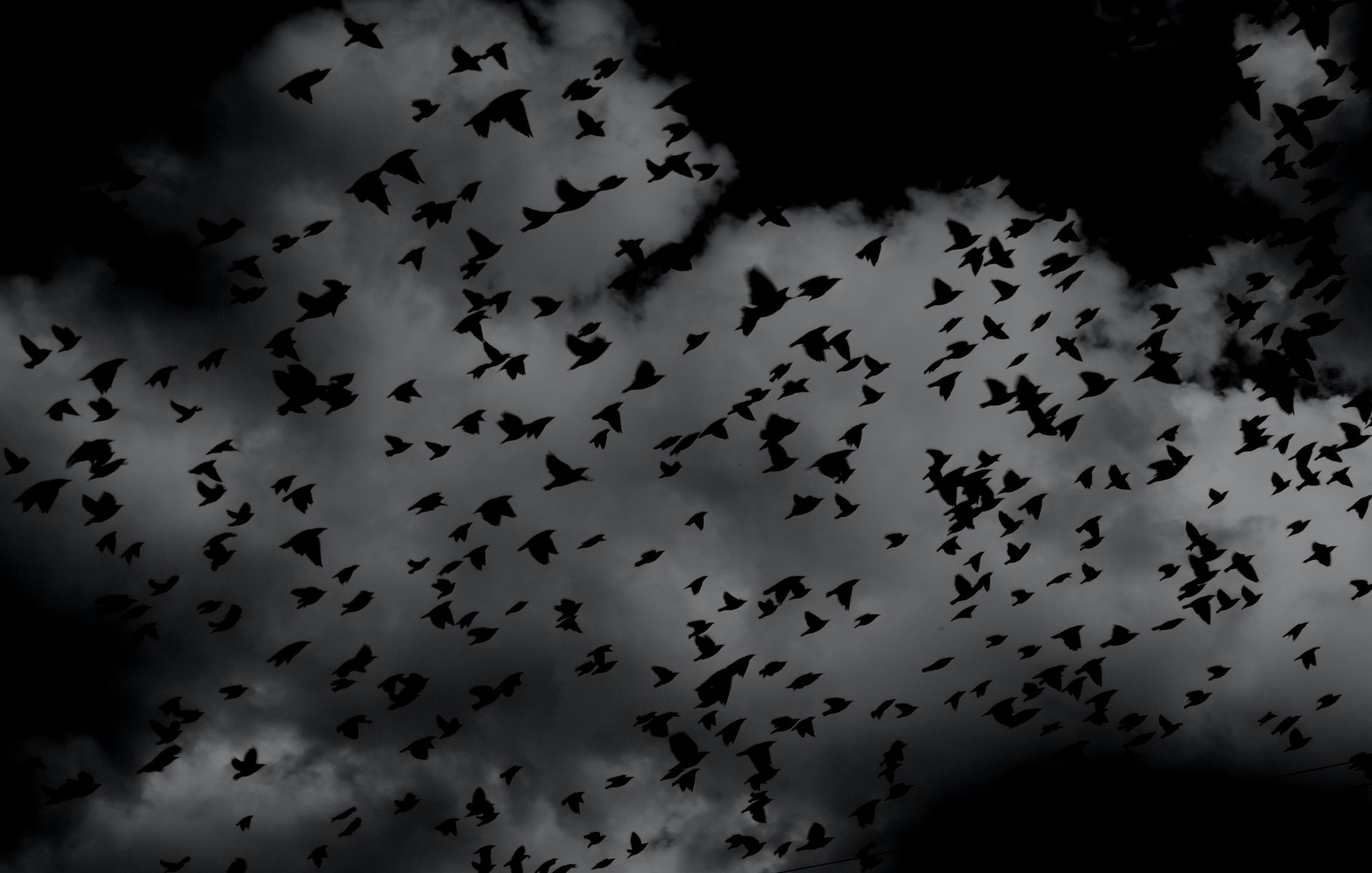by Jeremy Trager
“You’ll have to go up to the attic,” Cyn purred. “You’re new. That’s how you pay your dues.” She winked and sucked her cigarette.
“What attic?” I smiled. My bottom lip twitched.
“Over there.” Cyn jutted her chin toward a thin building across the courtyard. It had a sloped roof to help hustle Louisiana rains back down to earth. Its fleshy pink paint was peeling, giving way to bricks laid centuries ago. Palm leaves flirted with white wooden stairs and railings.
“Slave quarters?” I queried, then tongued my lip to keep it from shaking.
“Oh yeah,” Cyn sighed. “We use the attic for storage. Styrofoam containers, napkins, cups and lids, receipt rolls.” She looked down and mumbled, “It’s haunted.”
“This wouldn’t be the first French Quarter restaurant I’ve worked in that’s had a ghost or two.” The lip kept quivering without my permission.
Cyn used the underside of her shoe, sticky with syrup and liquor, to extinguish her cigarette. The gooey ash and smudged cinders resembled a smushed up cockroach.
“Going up there sucks. You just have to do it. The money’s good here.” Cyn huffed as she stood up. “Break’s over. I need to finish training you before the rush comes in.”
I clocked out and went to see my new manager, Richard. He was counting stacks of dollar bills. He barely looked up while we spoke.
“How was your first shift?” he asked.
“It was good. Cyn showed me around.”
“Did she take you up to the attic?”
“No, sir, but she said—”
“No need for sir and ma’am, unless you’re with a customer,” he advised. “You’ll go up each night and make a list of items to restock. It’s unpleasant, but it could be worse. Everything up there must be kept in its place. Understand?” He stopped counting, jotted down a number, then retrieved a flashlight and a ring of keys from his desk drawer.
“You’re going to need these.”
I clocked back in. I took the flashlight and keys and walked into the courtyard. I went up the white stairs of the outbuilding’s gallery and got jitters in my stomach—like moths bouncing around inside a dollhouse. On the second floor, I found a gray door Richard had described and the key that matched. I had to slam my shoulder against the door three times before it budged. Then it gave way to a fetid, pitch-black passage. I stepped in. The air smothered my lungs like miasmic charcoal smoke. I felt trapped in the belly of boat lost at sea.
Richard warned me there would be no light until I ascended the steps.
I switched on the flashlight and shined it up the stairs. They were wooden, uneven, and tiny, like they’d been designed for a child. For once, I was glad to be small. Little particles of dust scattered in the dark like fragile stars—stars that might scratch out my eyes.
I climbed one foot at a time. Slow. I tried to breathe, but the air was tar and mud. Halfway up, I stopped. How could I ever carry supplies down these hellish planks, I puzzled. At night. In the dark. I’m not cut out for it. But rent was coming up and good service jobs were scarce.
I raised my left foot; it felt anchored down by a heavy weight. I was weak. I slipped and fell hard on the stairs. My face was spared, but my hips and arms and knees were punished by old, unforgiving slabs. I gripped the flashlight with all my strength. I would not let go. But the light clicked off as I fell.
Shame. That’s what I felt. For falling. For being fragile, easy to hurt. Feeble.
Wanted to get to my feet, but my body wouldn’t cooperate. The heaviness of drawing breath made me so sleepy. So tired. Then a cold wind blew down from the attic and turned the space frigid. I shivered and thought about freezing to death. About being in the ground.
Then a footstep above me. And another. At the top of the stairs. In the attic. Creak, creak. Trudging soft on the boards. I listened until I was sure the footsteps were real.
“Who’s up there?” I whispered. I couldn’t help it.
The footsteps stopped.
I heard a perturbed sigh. Maybe a growl. A muted growl. Then, words.
“Have you seen my bird?” he groaned.
Footsteps scraped toward me down the stairs. The air shifted as the specter got closer.
I, prostrate, shook in rhythm with his clunks until I heard shallow breath above me, like a wolf perched over raw meat, and all went quiet.
It took an eternity to look up. I saw only blackness at first. Then, a reflection. Two glassy
eyes floating in the darkness like ebony mirrors. My finger found the switch on the flashlight and pressed it back on.
There was no man. Instead, there was a little gray bird. Severed. Headless. Blood crusted around its neck. Wings retracted. Frozen in time. Posed on the step. Standing upright like a proud man, ready to attack or defend itself from predators. Rigid, defiant, ripped asunder.
I blinked, and the bird was gone. Gone. Maybe I imagined it.
That awful voice again. From up in the attic. “Did you see my bird?” he asked with a little more steam, a little anger.
I aimed the light up and—I saw him. His rags. His glistening muscles. But he receded into shadow before I could find his face.
Sadness swept over me like ashes in the wind. I did not want to be afraid of him, but I was. I pitied him, too.
“What are you?” I called up.
I heard waves outside the walls: crest, recede, crest. Circling gulls. Wings sailing. The current of the river. Beckoning. Taunting. He spoke one last time with a bitterness in his throat:
“I am the bird.”
Jeremy Trager is a New Orleans-based writer, performer, and tour guide. He earned an MFA from the Creative Writing Workshop of the University of New Orleans, where he was awarded the Mimi Ayers Thesis Prize for his play, The Complete Annihilation of Victor Neuburg by Aleister Crowley. His plays have been read or workshopped at the UNO Playwrights Fest, Bailiwick Chicago, and the University of South Dakota, and published by Nola Gold Room. Other publications include Southern Review of Books, 433, Ellipsis, Midway Journal, The French Quarter Journal, and From Parts Unknown: A Pro-Wrestling Anthology with The Daily Drunk, available on Amazon.



Add your first comment to this post